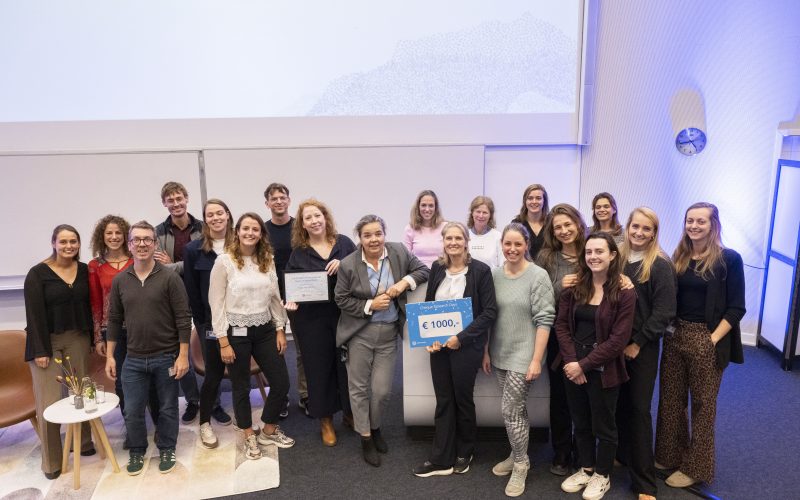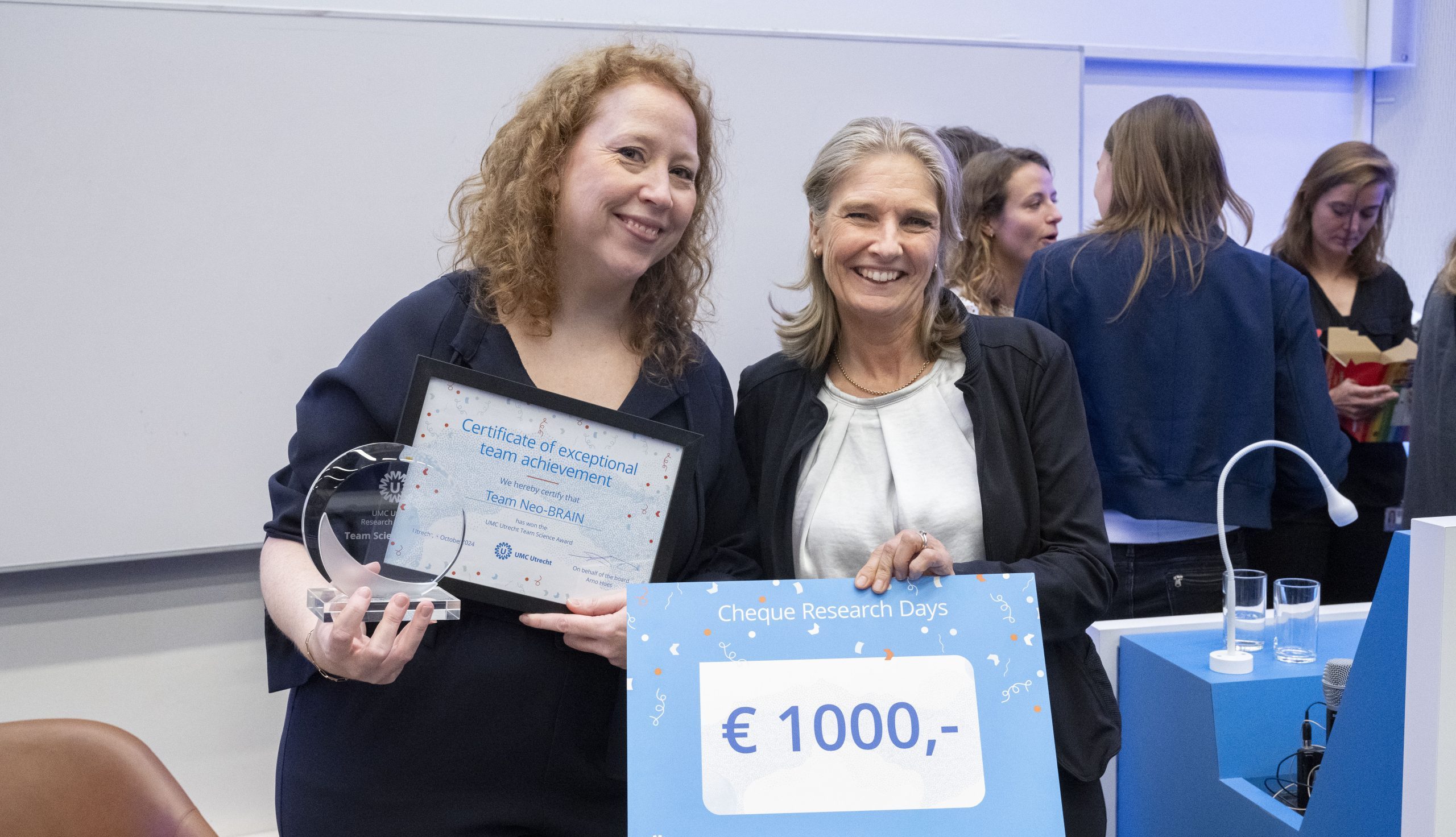Team Neo-BRAIN has received the second UMC Utrecht Team Science Award for interdisciplinary research. Manon Benders and Cora Nijboer received the prize, consisting of €1,000, a certificate and, of course, eternal glory, on behalf of the team. The prize was presented by vice dean Elly Hol at a special award ceremony on 3 October as part of the UMC Utrecht Research Days.
There were 19 entries for this year’s Team Science Award, of which the jury nominated three. These three teams campaigned within UMC Utrecht in the weeks leading up to the presentation (including via a video) and all colleagues in UMC Utrecht were able to cast their votes during this period. After counting over 500 votes, Team Neo-BRAIN emerged as the winner.
Neo-BRAIN receives the award for its research on preventing and treating brain damage in newborns at the intensive care unit (ICU). Brain damage occurs in these babies, for example due to a brain infarct or severe oxygen deprivation during delivery and can have lifelong consequences. No effective treatment options are available. After 14 years of collaborative research between the Department of Developmental Origins of Disease (DDOD) and the Department of Neonatology, a potential breakthrough is now on the horizon. In doing so, internationally renowned preclinical and clinical teams have joined forces to develop an innovative therapy using stem cells that can repair the damaged brains of newborns, offering hope for these vulnerable patients and their families.
We interviewed Manon and Cora about this potential new therapy and the team working on it. (continues below)
Cora Nijboer (left) and Manon Benders (right) show the Team Science Award 2024
What are the results of the research so far and how do they contribute to a solution to the problem?
‘Over the past 14 years, we have developed a comprehensive dossier with information on the mechanisms of action, optimal administration, efficacy and safety of intranasal mesenchymal stem cell therapy in newborns with brain damage. In doing so, we showed in experimental models that stem cells administered via the nose support brain repair by secreting beneficial factors in specific brain sections. This resulted in a long-term improvement of both brain damage (the size of the infarct area) and motor and cognitive function in newborn mice with this type of brain damage. These results led to the first Phase-I study on the safety and feasibility of intranasal stem cell therapy in babies with perinatal cerebral infarction, which saw promising results in addition to safety. We are now preparing a Phase-II study to investigate the efficacy of this therapy. We can do this study thanks to the support of the National Health Care Institute, the Brain Foundation Netherlands (Hersenstichting), and Vrienden UMC Utrecht & Wilhelmina Children’s Hospital. A multidisciplinary team of scientists, clinicians, two patient associations, regulatory experts, health economists, Utrecht Holdings and the Cell Therapy Facility of the UMC Utrecht is involved. As a result, we hope to make this important, cutting-edge therapy available in the Netherlands and elsewhere as soon as possible.’
Who are the members of the research team?
‘Besides us, Dr Cora Nijboer (preclinical team lead) and Prof Manon Benders (clinical team lead), the team includes Dr Nienke Wagenaar, Dr Femke Lammertink, Dr Niek van der Aa, Dr Caroline de Theije, Myrna Brandt, Dr Michael van der Kooij, Dr Thomas Alderliesten, Dr Maria Luisa Tataranno, Dr Jeroen Dudink and Dr Corine Koopman (follow-up). Also from Dr Renske ter Ham (health economist), Dr Johanneke Harteman (pediatric neurologist), Prof Jan Willem Gorter and Dr Marjolijn Ketelaar (pediatric rehabilitation). This large multidisciplinary and complementary team represents the strategic programs Brain, Child Health as well as Regenerative Medicine & Stem Cells. The team works from bench-to-bedside, from short- to long-term outcome, with more than 25 PhD students with a great diversity in nationality and background. We have a female-to-male ratio of about 2:1 and the team includes researchers at all stages of careers, from undergraduate and master students to PhD students and senior researchers, with backgrounds ranging from basic to translational and clinical research, and with expertise in health care evaluation and regulatory affairs. Moreover, our team works closely with parents of patients, parent organizations and patient associations at every stage of our research.’
What is the added value of collaboration within the research team?
‘Our collaboration integrates a wide variety of expertise and perspectives, leading to better and clinically relevant results. Using a jointly developed team chart, we work to create an open and trusting working environment where ideas are brought to the table and each member can provide constructive feedback. This enhances quality and promotes effective collaboration, which is aligned with the clinical needs of our ICU, for example by further refining preclinical models, improving prognosis and developing innovative treatments that improve long-term outcomes. This integrated workflow enables funding for multidisciplinary projects and, as a result, developments that would not have been possible with individual efforts.’
What is the team’s motto and how does it relate to a positive research and work culture?
‘Our team’s motto ‘Turning early-life challenges into thriving futures’ plays an important role in promoting a positive research culture with an emphasis on teamwork, mutual trust, transparency and shared goals. For example, we support researchers in organizing peer group coaching sessions, encouraging self-reflection, critical thinking and the constant improvement of personal and professional skills. We also value the integration of different areas of expertise, as this ensures that research best meets clinical needs. In doing so, each team member brings his/her own expertise, contributing unique input that is essential for out-of-the-box ideas (such as the idea of administering stem cells via the nose). A positive culture is further enhanced by a focus on mutual respect, work-life balance and recognition of both team interest and individual achievement.’
How is effective collaboration and a pleasant working atmosphere within the team ensured?
‘Creating a pleasant and supportive working atmosphere is essential for the success of our team. We organize weekly multidisciplinary team meetings to align our goals and ensure that we benefit from each other’s perspectives and ideas. Collaboration is essential and we actively involve young team members in projects so that they too have the opportunity to contribute and grow. To foster team cohesion, we often organize activities such as pizza meetings where researchers collaborate on focused topics from different perspectives, as well as game nights, summer barbecues, writing retreats, ski weekends and Christmas dinners to strengthen personal bonds and the team spirit.’

